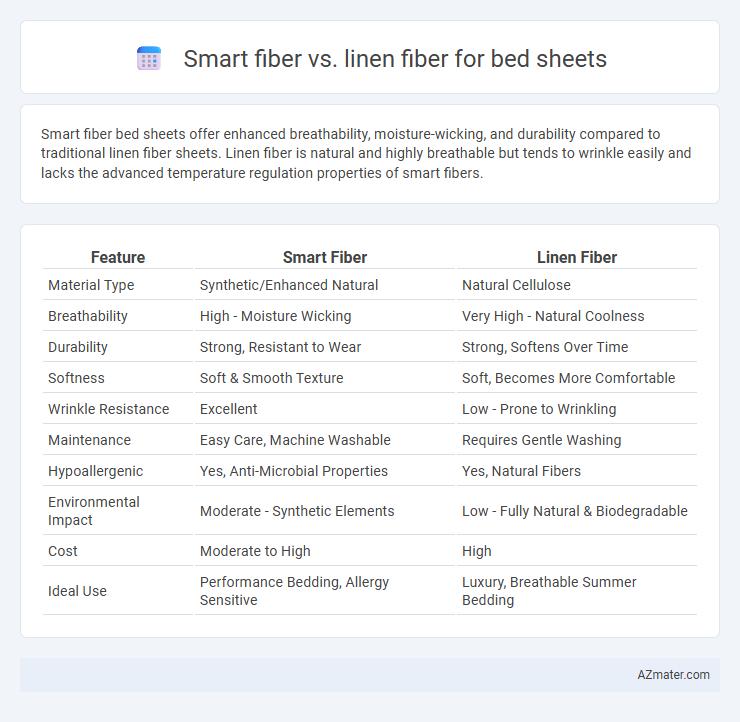Smart fiber bed sheets offer enhanced breathability, moisture-wicking, and durability compared to traditional linen fiber sheets. Linen fiber is natural and highly breathable but tends to wrinkle easily and lacks the advanced temperature regulation properties of smart fibers.
Table of Comparison
| Feature | Smart Fiber | Linen Fiber |
|---|---|---|
| Material Type | Synthetic/Enhanced Natural | Natural Cellulose |
| Breathability | High - Moisture Wicking | Very High - Natural Coolness |
| Durability | Strong, Resistant to Wear | Strong, Softens Over Time |
| Softness | Soft & Smooth Texture | Soft, Becomes More Comfortable |
| Wrinkle Resistance | Excellent | Low - Prone to Wrinkling |
| Maintenance | Easy Care, Machine Washable | Requires Gentle Washing |
| Hypoallergenic | Yes, Anti-Microbial Properties | Yes, Natural Fibers |
| Environmental Impact | Moderate - Synthetic Elements | Low - Fully Natural & Biodegradable |
| Cost | Moderate to High | High |
| Ideal Use | Performance Bedding, Allergy Sensitive | Luxury, Breathable Summer Bedding |
Introduction to Smart Fiber and Linen Fiber
Smart fiber bed sheets incorporate advanced synthetic materials designed for enhanced moisture-wicking, temperature regulation, and durability compared to traditional fabrics. Linen fiber, derived from the flax plant, is renowned for its natural breathability, hypoallergenic properties, and eco-friendly production, making it a preferred choice for sustainable bedding. Both fibers offer unique benefits, with smart fibers excelling in performance technology and linen emphasizing natural comfort and environmental impact.
Overview of Smart Fiber Technology
Smart fiber technology in bed sheets integrates microcapsules or phase-change materials that regulate temperature, providing adaptive comfort throughout the night. Unlike traditional linen fiber, which is derived from flax and offers natural breathability and moisture-wicking properties, smart fibers actively respond to body heat and environmental changes to maintain optimal sleep conditions. This innovation enhances durability and resistance to wrinkles while promoting a more personalized sleeping experience compared to conventional linen textiles.
Natural Qualities of Linen Fiber
Linen fiber, derived from the flax plant, boasts superior breathability, moisture-wicking properties, and natural hypoallergenic qualities, making it ideal for bed sheets that maintain comfort and freshness. Unlike synthetic smart fibers, linen's cellulose structure promotes temperature regulation and durability, providing a long-lasting, eco-friendly option. Its natural resistance to bacteria and allergens enhances sleep quality, positioning linen as a premium choice for bedding focused on health and sustainability.
Comfort and Softness Comparison
Smart fiber bed sheets offer superior moisture-wicking abilities and breathability compared to traditional linen fiber, enhancing overall comfort. Linen fiber is naturally textured and tends to soften with use, while smart fibers maintain consistent softness and smoothness due to advanced synthetic blends. The innovative structure of smart fibers ensures a softer, more comfortable feel from the first use, making them ideal for those seeking immediate comfort.
Durability and Longevity
Smart fiber bed sheets offer superior durability due to their advanced synthetic blend, providing resistance to wear and tear, fading, and shrinking, which extends the lifespan significantly. Linen fiber, while naturally breathable and strong, tends to soften and weaken over time with frequent washing, making it less durable than smart fiber options. The enhanced longevity of smart fiber sheets makes them ideal for consumers seeking long-lasting bed linens with minimal maintenance.
Breathability and Temperature Regulation
Smart fiber bed sheets feature advanced moisture-wicking and airflow technologies that enhance breathability by quickly dispersing heat and sweat, making them ideal for maintaining a cool sleep environment. Linen fiber, naturally porous and highly absorbent, excels at temperature regulation by allowing air to circulate freely and evaporate moisture, keeping the sleeper cool in warm conditions and warm when it's cooler. Both fibers promote breathability and temperature control, but smart fibers often incorporate innovative materials designed for optimized thermal management and faster drying times.
Ease of Care and Maintenance
Smart fiber bed sheets offer superior ease of care with their wrinkle-resistant and quick-drying properties, reducing the need for frequent ironing and extended drying times. Linen fiber sheets require more maintenance, including gentle washing and regular ironing to maintain their texture and prevent creasing. The high durability and moisture-wicking abilities of smart fibers simplify cleaning routines compared to the delicate handling linen fibers demand.
Hypoallergenic Properties
Smart fiber bed sheets offer superior hypoallergenic properties by effectively resisting dust mites, mold, and bacteria, making them ideal for sensitive skin and allergy sufferers. Linen fiber is naturally hypoallergenic and moisture-wicking, promoting breathability and reducing the risk of skin irritation, but it may harbor allergens if not properly maintained. Choosing smart fiber ensures enhanced allergy protection due to advanced antimicrobial treatments and easy maintenance, while linen provides natural hypoallergenic benefits with a focus on temperature regulation.
Eco-Friendliness and Sustainability
Smart fiber bed sheets, often made from recycled materials or innovative plant-based sources, offer enhanced Eco-Friendliness through lower water usage and reduced chemical treatments compared to traditional Linen fiber sourced from flax plants. Linen fiber is biodegradable and naturally hypoallergenic but requires significant water and pesticide inputs during cultivation, impacting sustainability. Smart fibers typically have a smaller carbon footprint and faster decomposition rates, making them a more sustainable option for eco-conscious bedding choices.
Choosing the Best Fiber for Your Bed Sheets
Smart fiber bed sheets offer enhanced durability, moisture-wicking properties, and antimicrobial features, making them ideal for active sleepers and allergy sufferers. Linen fiber provides natural breathability, exceptional temperature regulation, and a soft, textured feel that improves with each wash, perfect for those seeking a comfortable and eco-friendly option. When choosing the best fiber for your bed sheets, consider your sleep environment, sensitivity to allergens, and preferences for maintenance and texture.

Infographic: Smart fiber vs Linen fiber for Bed sheet
 azmater.com
azmater.com